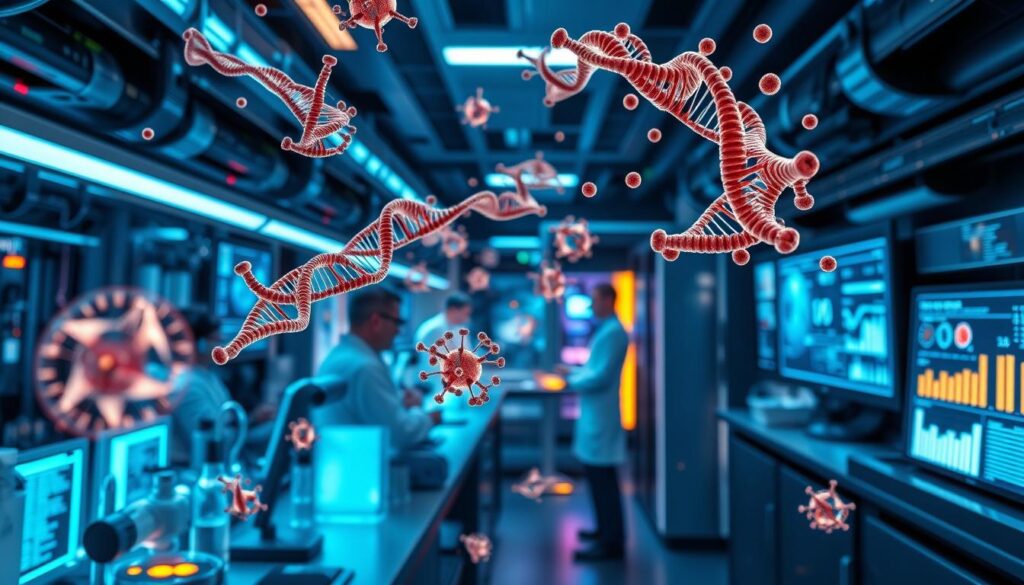The five-year survival rate for pancreatic cancer has been very low, at just 12%. But, new mRNA cancer vaccine technology is bringing hope for better treatments. In a phase 1 trial, an mRNA vaccine for pancreatic cancer showed strong immune responses. These responses lasted in patients’ blood for up to three years.
This breakthrough is just one sign of how mRNA vaccines are changing cancer care. By using this technology, scientists are making vaccines that fit each patient’s tumor. This could change the future of fighting cancer.
Key Takeaways
- mRNA cancer vaccines offer promising new treatments, with durable immune responses observed in clinical trials
- Personalized mRNA vaccines tailored to individual tumor profiles are showing potential to become a standard in cancer care
- The adaptability of mRNA technology allows for its exploration in a wide range of diseases, including infectious diseases and other cancers
- Ongoing research and clinical trials are focusing on combining mRNA vaccines with other immunotherapies to improve outcomes for patients with limited treatment options
- Overcoming technical challenges, such as cold chain storage requirements, will be crucial for the widespread adoption of mRNA cancer vaccines
The Evolution of Cancer Treatment: From Traditional Therapies to mRNA Innovation
Cancer treatment has changed a lot in recent years. New therapies use the immune system to fight cancer. mRNA technology has led to big changes in how we treat cancer, offering new hope to patients.
Historical Perspectives on Cancer Treatment
For a long time, chemotherapy and radiation were the main ways to treat cancer. These methods work well but can have bad side effects. Doctors have been looking for better ways, like immunotherapy and personalized medicine.
The Emergence of mRNA Technology
mRNA technology became famous during the COVID-19 pandemic. It showed how fast and effective it can be. Now, mRNA-based therapeutic vaccines are being used to treat cancer, showing great promise.
Key Milestones in Cancer Vaccine Development
In the last 20 years, many ways to deliver cancer vaccines have been tried. These vaccines have shown strong results in fighting cancer. mRNA vaccines are especially promising because they are safe, quick to make, and can target many types of cancer.
| Cancer Type | Clinical Trials |
|---|---|
| Non-Small Cell Lung Cancer | ✓ |
| Gastric Adenocarcinoma | ✓ |
| Pancreatic Adenocarcinoma | ✓ |
| Colorectal Adenocarcinoma | ✓ |
| Breast Cancer | ✓ |
| Colon Cancer | ✓ |
| Gastrointestinal Cancer | ✓ |
| Neoplasm Metastases | ✓ |
| Glioblastoma | ✓ |
| Renal Cell Carcinoma | ✓ |
| Sarcomas | ✓ |
| Malignant Glioma Astrocytoma | ✓ |
The work on cancer vaccines has come a long way since William B. Coley’s early work. Now, mRNA vaccines are at the forefront, showing great promise in cancer treatment.
Understanding mRNA Cancer Vaccines: Mechanism and Function
Molecular engineering has led to a new way to fight cancer – mRNA cancer vaccines. These vaccines use messenger RNA (mRNA) to tell cells to make proteins that fight cancer. This helps the body’s immune system attack cancer cells.
The way mRNA cancer vaccines work is simple yet powerful. They mimic how cells naturally make proteins. This process, called precision oncology, targets cancer-specific proteins. It makes the immune system fight the cancer more effectively.
One big plus of mRNA cancer vaccines is how fast they can be made. Unlike old vaccine methods, mRNA vaccines can be ready in weeks. This speed is key in the battle against cancer, where every day counts.
Also, mRNA vaccines can change to fight different cancers easily. This means each vaccine can be made just for a person’s cancer. This personal touch makes the treatment more effective.
“Over the past 30 years, researchers have learned to engineer stable forms of mRNA and deliver these molecules to the body through vaccines.”
| Advantage | Benefit |
|---|---|
| Rapid Development and Production | Potential for faster response to emerging cancer threats |
| Flexible Targeting | Ability to personalize vaccines for individual patients |
| Potent Immunogenicity | Strong humoral and cell-mediated immune responses |
The field of molecular engineering is growing fast. mRNA cancer vaccines are a big hope for changing how we treat cancer. With more research and trials, these vaccines could change the game for cancer patients and their families.
Breakthroughs in Pancreatic Cancer Treatment
Pancreatic cancer is very deadly, with a five-year survival rate of just 12%. But, new hope comes from personalized medicine and therapeutic vaccines. These advancements could change how we treat pancreatic cancer.
Current Survival Rates and Challenges
In 2024, over 66,000 Americans will face pancreatic cancer. This shows how big of a problem it is. Right now, only about 10% of people survive five years after being diagnosed.
Recent Clinical Trial Results
Dr. Vinod Balachandran at Memorial Sloan Kettering Cancer Center led a phase 1 trial. They tested an mRNA vaccine called autogene cevumeran. It made T cells attack pancreatic tumors, and some patients’ immune responses lasted up to three years.
The trial plans to include 260 patients at different sites. This shows the vaccine’s potential to help many people. The first results were promising, with side effects similar to those from COVID-19 vaccines.
Impact on Patient Outcomes
Some patients in the trial were completely cured. This gives hope for a cure for others. The mRNA vaccine technology could create a lasting immune memory against cancer.
But, making the vaccine from each patient’s tumor is complex. More research is needed to fully understand its long-term effects. This highlights the need for ongoing studies and data analysis.
Advances in Lung Cancer Immunotherapy
At the MD Anderson Cancer Center, researchers are leading the way in cancer immunotherapy for non-small cell lung cancer (NSCLC). They’re using precision oncology with mRNA-based vaccines. Their goal is to boost the immune system’s fight against lung cancer.
Clinical trials are exploring mRNA vaccines with checkpoint inhibitors. This combo might lead to better survival rates for those with few treatment options. mRNA’s flexibility means it can quickly adapt to new cancer types.
- The last ten years have seen the introduction of immune checkpoint inhibitors (ICIs) in the therapeutics of NSCLC, bringing durable responses and significant survival benefits.
- However, a subset of patients exhibit resistance to ICIs, either primary or acquired, present in a non-negligible proportion.
- Therapeutic anticancer vaccines have faced challenges, primarily of a pharmaceutical technology nature in terms of optimal vaccine formulation for safety and effectiveness.
- Messenger RNA (mRNA) vaccines have garnered interest due to the success of mRNA technology in developing vaccines against SARS-CoV-2.
As we explore more in cancer immunotherapy and precision oncology, mRNA-based vaccines could change NSCLC treatment. They offer new hope for patients and their families.
The Role of Personalized Medicine in mRNA Vaccine Development
Personalized medicine is changing how we treat cancer, making treatments more precise. In mRNA cancer vaccines, this change is clear. Scientists are making vaccines that match each patient’s tumor’s unique genetic makeup.
Genetic Profiling and Custom Vaccines
Scientists use advanced techniques to find unique proteins on cancer cells. These proteins are the basis for personalized mRNA vaccines. The vaccines teach the immune system to fight these cancer cells.
The mRNA technology allows for quick changes to match different tumors. This means each patient gets a vaccine made just for them. This could lead to better results and outcomes for patients.
Integration with Existing Treatments
Personalized mRNA vaccines are meant to work alongside other cancer treatments. Combining them with chemotherapy and immunotherapy could make treatments even more effective. This could be a big step in fighting cancer.
Early trials show promise. Personalized mRNA vaccines are working well with other treatments. This mix of personalized medicine and mRNA technology could change cancer care for the better.
Future Applications
The future looks bright for personalized medicine, molecular engineering, and precision oncology. Personalized mRNA vaccines could soon be a common treatment for cancer. As the tech improves, it might also help with other diseases.
“Personalized mRNA vaccines are a game-changer in the fight against cancer, offering a targeted and adaptive approach that holds immense promise for the future of healthcare.”
Clinical Trials and Research Developments
The field of therapeutic vaccines and synthetic biology is growing fast. BioNTech shared good news on mRNA cancer vaccines at the 2024 ESMO Congress. They are looking into mRNA vaccines for many cancers, like pancreatic, lung, brain, and liver cancers.
At the University of Florida, researchers made an mRNA vaccine for cancer. It worked well in small trials with dogs and humans with brain cancer. The vaccine made the immune system fight tumors strongly.
In pancreatic cancer, a trial showed the mRNA vaccine worked for half of the patients. After three years, 8 patients had a strong immune response. And 6 of them didn’t get cancer back.
This fast progress in mRNA research is exciting. It’s also being tested for diseases like malaria, HIV, and tuberculosis. This shows how versatile mRNA technology is.
| Therapeutic Vaccine Type | Advantages | Disadvantages |
|---|---|---|
| mRNA Vaccines |
|
|
| DNA Vaccines |
|
|
| Bacterial and Viral Vector Vaccines |
|
|
As we move forward, these new ways of fighting cancer and other diseases are very promising. They could change how we treat many illnesses.
“The rapid progress in mRNA research underscores the importance of continued scientific exploration.”
Challenges and Limitations in mRNA Cancer Vaccines
The field of gene therapy and molecular engineering is growing fast. mRNA cancer vaccines are part of this growth. But, they face many challenges and limitations.
One big problem is storing and sending these vaccines. They need to be kept cold to work well. This makes it hard, especially in places without good storage.
Storage and Distribution Issues
mRNA vaccines are very sensitive to temperature changes. They need special care when stored and moved. This can be tough, especially in areas with poor infrastructure.
But, scientists are working hard. They’re trying to make these vaccines more stable and easier to send. This will help more people get them.
Cost Considerations
Making and sending mRNA cancer vaccines is expensive. This makes it hard for them to be used everywhere. It’s a big problem, especially in places with less money.
Groups like the World Health Organization (WHO) are trying to help. They want to make sure these vaccines get to everyone who needs them.
Technical Barriers
There are also technical problems to solve. These include making the vaccines better and finding ways to send them easily. Scientists are looking for new ways to do this.
Even with these challenges, mRNA cancer vaccines are very promising. Researchers are working hard to solve these problems. They want to make these vaccines better and more available to fight cancer.
“The development of mRNA cancer vaccines has faced several challenges and limitations, but researchers are dedicated to addressing these issues to unlock the full potential of this transformative technology in the fight against cancer.”
Global Impact and Market Potential
The success of mRNA vaccines against COVID-19 has made a big splash. Companies like Moderna, Pfizer, and BioNTech are now diving into using mRNA for cancer treatments. This could change cancer care and help more people survive different types of cancer.
Right now, over 60 mRNA cancer vaccines are in clinical trials. The US and China are leading with more than 45 of these. Two mRNA vaccines are in the final stage of trials, Phase III. This means we could see the first approval by 2029.
mRNA technology is quick to adapt and develop, making it key in fighting new health threats. It’s also a big step towards personalized medicine. The market for mRNA cancer vaccines is expected to hit over $1 billion soon. In the first five years, sales could reach a whopping $5 billion. This shows how mRNA cancer vaccines could change cancer treatment and improve patient outcomes.






